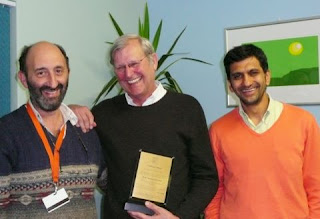Nicole Paulsen

Highlights: Definitely and without a doubt the Global Project evaluation meeting in Cairo, Egypt. Since the age of eleven, I have always dreamed of one day going to the land of the Pharaohs and in July 2009 I did. OH, WHAT A MAJESTIC PLACE, filled with such an enriching history. Not only was it an amazing experience meeting Doctors and Psychologists from 5 other countries but also learning about the various issues they face in their countries, and the interventions they make with regard to the rehabilitation of victims of torture. Presenting the global project data on behalf of the Political Violence Programme, with Gugu was quite exciting as the entire team worked extremely hard on this. Finally seeing the fruits of our hard work, made that moment a very proud and spectacular one.
Lowlights: The incident in De Doorns made me realise that there is a lot of unresolved issues and misperceptions between foreign nationals and South Africans. However my lowlight is seeing young, innocent children not only forced to face such traumatic experiences but also forced to suffer the consequences of xenophobic attacks, something they did not ask for, something they should not have to endure. Witnessing this was very tough for me, but more importantly encouraged me to continue the fight against the violation of people’s, especially children’s human rights.
Miriam Fredericks
Highlights: There were so many:
The Guguletu Project Launch!!
The UN International Day in Support of Torture survivors on 26th June at the Nelson Mandela Gateway
The dialogues on community violence
The GLOBAL project Research - WOW what an achievement!!
The GLOBAL project evaluation meeting in Cairo - wonderful participation: 6 countries meeting, sharing experiences, resources and knowledge.
Witnessing the community theatre staged at 5 schools by our CVP program.
Presenting at an International Conference in Bulgaria, highlighting 2nd generation issues.
The amalgamation of work at Trauma Centre, teams working well together and knowing we are contributing not only to our communities but also the development of skills in our therapists.
The enormous training of professionals and volunteers we have accomplished for the year.
Serving as a council member on the International Rehabilitation Council for Torture victims/survivors.
The support from local funders, Investec, HCI, Dept.of Social Development,UNODC and our international partners, Oak Foundation,European Union and UNVFVT.
Lowlights: Very sadly we have had many personal losses at the Trauma Centre this year. Not only do we work with pain and the major loss of our clients but we had 6 staff members’ lose relatives in this year!! However THE BIGGEST LOSS -was that of a colleague from the Gaza Strip who attended the Global evaluation meeting with us in Cairo and could not reach home because the Israeli army closed the border. So, although his home was within eyesight, he died in Egypt, while waiting for the 2 weeks before the border was re-opened.
Long live the struggle against oppression and torture globally.

Dr Abu Mo'alek, the Gazan psychiatrist, who died in Egypt in August without being able to get home, is the man standing on the extreme right













